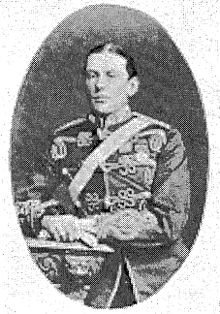Edric Gifford, 3rd Baron Gifford
| Edric Frederick Gifford, 3rd Baron Gifford | |
|---|---|
 |
|
| Born | 5 July 1849 Cirencester, Gloucestershire |
| Died |
5 June 1911 (aged 61) Chichester, West Sussex |
| Buried at | Fairfield Road Cemetery, Bosham |
| Allegiance |
|
| Service/branch |
|
| Rank | Major |
| Unit |
83rd Regiment of Foot 24th Regiment of Foot 57th Regiment of Foot |
| Battles/wars | Third Anglo-Ashanti War |
| Awards | Victoria Cross |
| Relations |
Robert Francis Gifford, 2nd Baron Gifford (father) Maurice Gifford, CMG (brother) John Fitzhardinge Paul Butler VC (nephew) |
Major Edric Frederick Gifford, 3rd Baron Gifford VC (5 July 1849 – 5 June 1911) was an English recipient of the Victoria Cross, the highest and most prestigious award for gallantry in the face of the enemy that can be awarded to British and Commonwealth forces.
Edric Gifford was born in London on 5 July 1849. His father was Robert Francis Gifford, 2nd Baron Gifford, and his mother was Hon. Swinburne Frederica Charlotte FitzHardinge Berkeley. His brother was Maurice Gifford, CMG, who raised "Gifford's Horse" in the Second Matabele War.
He was educated at Harrow, and in 1869 entered the 83rd Foot. On the death of his father in 1872, he became 3rd Baron Gifford.
In 1874, at the age of 23, Gifford was a lieutenant in the 2nd Battalion, 24th Foot (later the South Wales Borderers), British Army during the Third Anglo-Ashanti War, when the events took place which resulted in the award of his Victoria Cross with the citation:
For his gallant conduct during the operations, and especially at the taking of Becquah. The Officer commanding the Expeditionary Force reports that Lord Gifford was in charge of the Scouts after the Army crossed the Prah,' and that it is no exaggeration to say that since the Adansi Hills were passed, he daily carried his life in his hand in the performance of his most dangerous duties. He hung upon the rear of the enemy, discovering their position, and ferreting out their intentions. With no other white man with him, he captured numerous prisoners; but Sir Garnet Wolseley brings Him forward for this mark of Royal favour most especially for his conduct at the taking of Becquah, into which place he penetrated with his scouts before the troops carried it, when his gallantry and courage were most conspicuous.
...
Wikipedia
